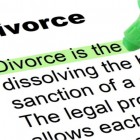Our government is an extremely curious creature; it likes to know as much about us as it can. You’ve seen the news stories about surveillance and privacy. The National Security Agency (NSA), for example, monitored nearly 125 billion phone calls in just one month, according to a number of news reports in 2013, and it’s only of many federal agencies that have a great deal of interest in our private affairs. When money, property, or investments change hands, the Internal Revenue Service (IRS) is the agency that wants to know, because your income taxes will be affected. Income tax season is here once again, along with the accompanying paperwork, headaches, anxiety, and confusion. One thing that can make taxes even more difficult and confusing – and sometimes costlier – is if you are divorcing, recently divorced, or if you are anticipating an imminent divorce.
With April 15 coming up fast, you may be concerned about whether you should file for divorce first or if you should file your tax return first. In a divorce, even if your finances are modest, your ex might take some of your assets and property, but an even bigger threat to your assets and property is the IRS. Of course, the overall impact of your divorce on your taxes will hinge on your unique personal situation, and understanding exactly what’s at risk in your own case can help you stay out of trouble with the IRS. Going into a divorce, whether your finances are modest or more affluent, you must have the insights and representation of a seasoned divorce attorney who fully understands the tax issues involved in the divorce process. In southern California, you should speak first with an experienced Orange County divorce lawyer.

However, you should also know right now that there is no need to panic about the April 15 income tax deadline. This tax season, the IRS is only interested in knowing what your marital status was at the conclusion of 2015. Filing for taxes first or filing for divorce first is your choice, although you may still want to make that choice with the help of an experienced divorce attorney. However, for this tax season, the IRS will categorize you as “divorced” only if your divorce was final on or before December 31, 2015. If you were still married when 2015 ended, the IRS will categorize you as married for tax year 2015 without regard to your marital status subsequent to December 31, 2015. If you and your spouse were legally or informally separated in 2015, you are still categorized by the IRS as married for that year if no final court judgment dissolving the marriage was issued in 2015.
FILING JOINTLY
If your divorce is now pending but has not yet been finalized, you and your spouse may file a joint return for tax year 2015 if both of you agree to file jointly. First, however, you should seek advice from your divorce attorney and from your tax advisor regarding the pros and cons of filing your income tax return jointly. In most cases – although not all, and it depends on a number of factors – your final tax amount will be lower if you can arrange to file jointly. The disadvantage of joint filing is joint liability, although a tax indemnification agreement may offer you some protection. An indemnification agreement places liability on the spouse who prepares the joint return and protects the spouse who didn’t. If you choose to file jointly, ask your divorce attorney if you need to obtain a tax indemnification agreement.
What is imperative when you are filing jointly is knowing for certain how the two of you will handle any federal tax refund or liability. If a refund check is coming in the mail, be sure that the check is payable to both of you, or have a written document signed by both of you stipulating that both spouses will receive their fair share of the refund. If the tax refund is in the form of a direct deposit, have it placed in a joint account – or obtain a written agreement that protects your share.

If you do not want your spouse to prepare a joint income tax return, either have the joint return done professionally or just file your own federal income tax return separately. You certainly cannot be forced – by a judge or anyone else – to file a joint tax return if you prefer not to. If you choose to file separately but your divorce was not final on or before December 31, 2015, and the IRS thus categorizes you as married for tax year 2015, you should file as either “head of household” or as “married filing separately,” depending on your personal circumstances.
Filing as a “head of household” allows you to claim the dependent care credit and the earned income credit as well as the standard deduction, and it may also reduce your overall tax burden. You may file as head of household if your spouse did not live with you for at least the last six months of 2015, if you were responsible for more than half of your household’s expenses in 2015, and if your home was the primary residence of your child or children for more than half of the year.

IF YOUR DIVORCE WAS FINAL IN 2015
If your divorce was final on or before December 31, 2015, the IRS will categorize you as divorced for that tax year, and you cannot file jointly. Your filing status will be “single” or “head of household.” If you can claim exemptions for your child or children after the divorce is finalized, it can make a huge difference in the final tax amount you will owe. Child support and property distribution payments are not considered income for the receiving ex-spouse and are not deductible for the paying ex-spouse. However, alimony payments – now called “spousal support” in most states – are a different matter entirely, and during a divorce, you must consider not only how much spousal support you will pay or receive, but you also must consider the tax impact of spousal support payments. If you receive payments, nothing will be withheld or deducted, and that could mean a big tax hit unless you take some kind of action. You can reduce the tax impact of receiving alimony by arranging with the IRS to pay your income taxes quarterly or by having your employer withhold more from each of your paychecks.
As mentioned above, child support and property distribution payments are not tax deductible, but if you make alimony payments, because those payments are tax deductible, the IRS may decide to investigate your finances. The agency scrutinizes alimony payments in the initial three years subsequent to a divorce to ensure that you are not deceptively making nondeductible payments – distributions of assets and property or obligations like legal fees – as alimony payments to make them deductible.

DON’T MAKE THINGS WORSE – HELP IS HERE
Let a good divorce lawyer advise you and help you to keep your finances in order as you divorce and transition into the next part of your life. You will need a divorce lawyer who will help you answer the IRS if it has questions regarding the spousal support you pay or receive or about any other divorce-related tax matter. Do not hesitate or be embarrassed to ask your divorce lawyer about the financial and tax issues related to your divorce – these are routine matters for attorneys who focus exclusively on divorce and family law. If it’s necessary, your divorce attorney can work with or refer you to financial advisors, tax specialists, professional financial counselors, and other helpful resources in your community. Taxes, of course, are not your only financial concern in a divorce. Take these important steps as early as possible in the divorce process to safeguard yourself, your children, and your financial future:
- Cancel all joint expenses.
- Establish a budget and adhere to it.
- If necessary, change the beneficiary’s name on your policies and accounts.
- Examine your life insurance policy to determine if it needs to be altered.
- Review your financial, retirement, and estate plans.
Divorce never goes smoothly, it is never easy, and for most people a divorce is deeply stressful, profoundly exhausting, and emotionally painful. You have to deal with major life changes and tough financial questions at precisely the same time you are emotionally vulnerable. If a divorce means a significant change to your finances and your income, thoughtful financial preparation and careful planning will be required. Financial details are a big part of any divorce, and the more you and your spouse own, the more complicated your divorce will become. Don’t make it worse by failing to confront aggressively the tax issues raised by your divorce. Arrange instead to consult with an experienced divorce lawyer who knows how divorce impacts your taxes – someone who can help you fully understand your own tax and financial situation. If you are divorcing in southern California, take your case to an experienced and trustworthy Orange County divorce lawyer who will fight for your best long-term financial interests. If you are divorcing or considering divorce right now, make the call as quickly as possible.










































